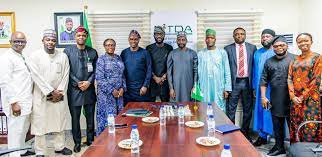Google West Africa made a presentation to the Director General of the National Information Technology Development Agency (NITDA), Kashifu Inuwa CCIE,in Nigeria where it introduced its new Director for the continent, Mr. Olumide Balogun.
In the presentation, Google made a commitment to further develop the existing partnership between the two organizations.
Mr. Balogun, who led other Google executives to the Agency’s Corporate Headquarters in Abuja, said that the familiarization visit to NITDA has become vital since it will underline Google West Africa’s pledges to expanding the cooperation. Mr. Balogun accompanied the other Google officials to the Headquarters of the Agency.
Read also: Google’s first West African Director, Dr. Juliet Ehimuan steps down
Remarks from Google
Balogun said, “I have been at Google for four years, recently now taking over the West Africa Director lead role. And our coming here today is to identify the critical steps that we need to take to jointly actualise the Nigerian President’s initiative to drive 1 million digital jobs because Google cannot thrive in isolation.”
Mr. Balogun divulged the information that Google has been working on the Internet in Africa for more than eight years. According to what he says, “In 2015, during our premier developer event, we announced that Google has shifted from being a mobile first company to an AI first company. So, we were quite amused with all the chat GPT conversations.”
While the Director is disclosing that Google is at present working on a document that would detail the impact of Artificial Intelligence in Africa, which will be launched in September in University of Johannesburg, South Africa, the Director is inviting the Director General of the NITDA, Kashifu Inuwa, to deliver keynote address at the event. Kashifu Inuwa will also be disclosing that Google is presently working on a document that would explain the impact of Artificial Intelligence in Africa.
In his remarks, the head of the NITDA reaffirmed his conviction that they are capable of generating one million digital employment provided they collaborate to develop a plan outlining how they want to accomplish their objective.
NITDA embarks on blockchain integration for NYSC certificate validation
Remarks by NITDA
According to Inuwa, NITDA is putting Nigeria in a position where it may see faster job development in a digital economy. To that end, “We are looking at the Nigeria Startup Act, which identifies some initiatives such as the talent development that can enable job creation. Nigeria can position itself to bridge the gap because we have youthful population,” he said.
He pointed out that the responsibility of the government in the ecosystem is to intervene in terms of policies, regulations, and infrastructure when it is necessary and that the goals of any regulation are to assist in the creation of a market, democratise access to services, protect consumers, improve service delivery, and enable innovation.
“Basically, Regulation can be rule based and non-rule based. Non-rule based is what we advocated for. To allow the ecosystem players to self-regulate themselves, put the standard in place, and we can help to ensure new entrance comply to that standard because what we are after is to have a responsible and ethical views of platforms around the world,” he said.
Inuwa further divulged that NITDA is changing people’s mindsets regarding the perspective on the method that the government takes to regulation and policy. He added that the Agency is co-creating with the ecosystem in whatever that it undertakes.
He emphasised that because Nigeria has a large population of young people, the country is in a position to position itself to bridge the gap in digital transformation.
“In 2018, digitally transformed enterprise contributed 18.5% of global GDP. It was projected to reach 53.3% this year, that is over 50% of the global GDP. The generative AI is going to add about 7 trillion US dollars,” he said.
While noting that NITDA’s cooperation with Google Developers Group has led to the education of 150,000 young people in Nigeria, Inuwa said:
“Presently we have an initiative running here in Abuja at our National Center for Artificial Intelligence and Robotics (NCAIR), and we want to expand same programme to other states in collaboration with the GDG as well. We are looking at how we can build technology development zones in partnership with universities to promote smart manufacturing.”
“Similarly, we are also looking at how to establish the seed investment fund to all the startups to attract investment. Last year, over 626 billion was invested but only 3.5% came to Africa and if you look at our population, we can do more than that; these are some of the ideas we need the stakeholders like you to come work with us on,” he concluded.
















